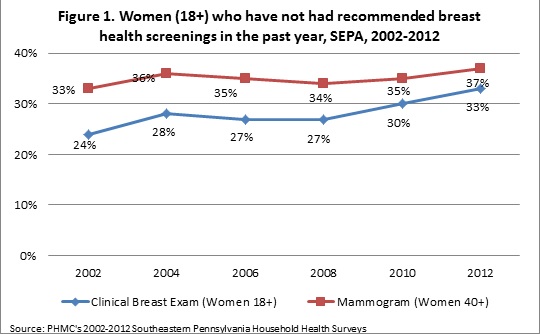NEWS RELEASE
FOR IMMEDIATE RELEASE
October 23, 2014
Contact: Veronica Mikitka Reed vmikitka@mavenagency.com 215.434.7194
PHMC releases statistics on regional preventive breast health screenings in recognition of National Breast Cancer Awareness Month
PHILADELPHIA— Thirty-seven percent of women 40 years of age and older in Southeastern Pennsylvania (SEPA) did not have a mammogram in the past year, according to survey data released today from the 2012 Southeastern Pennsylvania Household Health Survey, an biennial survey conducted by Public Health Management Corporation's (PHMC's) Community Health Data Base (CHDB). The survey asked female respondents how long it had been since her last mammogram (for women 40+) or clinical breast exam (for women 18+), providing a range of time frames as response options.
The American Cancer Society recommends yearly mammograms starting at age 40 and continuing for as long as a woman is in good health. Clinical breast exams are recommended about every three years for women in their 20s and 30s, and every year for women 40 and older.
The data was released in recognition of National Breast Cancer Awareness Month, an annual campaign to increase awareness of the disease and to encourage preventive measures and early detection. Survey findings include:
Preventive Breast Health Screenings
• The percentage of women 18 years of age and older who have NOT received a clinical breast exam in the past year has increased from just under one-quarter (24%) in 2002 to one-third (33%) in 2012.
• The percentage of women 40 years of age and older who have NOT had a mammogram in the past year has increased slightly from one-third (33%) in 2002 to 37 percent in 2012.

• Since 2002, when looking at race/ethnicity, Asian women are consistently the least likely to have had a clinical breast exam (18+) or mammogram (40+) in the past year. Black and white women are the most likely to have had breast exams and mammograms in the past year.
• In addition, since 2002, women (18+) in Philadelphia County are slightly more likely NOT to have had a clinical breast exam in the past year. Comparable percentages of women (40+) in each of the five Southeastern Pennsylvania Counties did NOT have a mammogram in the past year from 2002 to 2012.
• In the past 10 years, women living below 100 percent of the Federal Poverty Level (FPL) are more likely NOT to have had a clinical breast exam (women 18+) in the past year and NOT to have had a mammogram (women 40+) in the past year in comparison to women at or above 100 percent of the FPL.
Breast Cancer Screening and Other Health Indicators
• From 2002 through 2012, women who are in fair or poor health are more likely NOT to have had a clinical breast exam (women 18+) and NOT to have had a mammogram (women 40+) in the past year compared to women in excellent, very good or good health.
• Also, from 2002 through 2012, women (18+) who do not have a regular source of care are more likely NOT to have had clinical breast exam in the past year compared to women with a regular source of care. Similarly, women (40+) without a regular source of care are more likely NOT to have had a mammogram in the past year.
• Women (18-64) who are uninsured are also more likely NOT to have had a clinical breast exam in the past year compared to women with health insurance coverage. The same applies for uninsured women (40-64) and mammogram screenings in the past year.
The Household Health Survey is conducted by telephone and includes 10,000 households in the SEPA region (Bucks, Chester, Delaware, Montgomery and Philadelphia Counties). For more information about these findings, contact Sarah Ingerman at singerman@phmc.org.
About Public Health Management Corporation's Community Health Data Base
Public Health Management Corporation (PHMC) is a nonprofit public health institute that creates and sustains healthier communities. The Community Health Data Base (CHDB) includes the Household Health Survey, one of the largest regional health surveys in the country. The Pew Charitable Trusts, , United Way of Southeastern Pennsylvania, United Way of North Penn, Green Tree Community Health Foundation, North Penn Community Health Foundation, Thomas Scattergood Foundation, Pottstown Area Health and Wellness Foundation, and over 350 local agencies from the health, government, nonprofit and academic sectors, help to support the CHDB and survey. For more information, visit www.phmc.org.
###